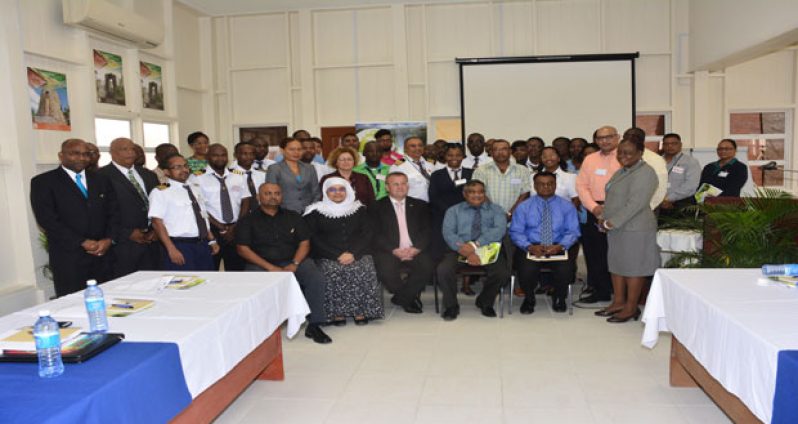GUYANA yesterday came in for high praise for not only protecting its priceless natural resources, but also for its efforts in combatting international environmental crime.CARICOM Secretariat General Counsel Safiya Ali said Guyana is one of the few countries in the Region that is party to Multinational Environment Agreements (MEAs) that are vital to sustainable development, locally and farther afield.
These are the Basel Convention on the Control of Transboundry Movement of Hazardous Waste and their Disposal; the Stockholm Convention on Persistent Organic Pollutants; the Rotterdam Convention on the Prior Informed Consent Procedure for Containing Hazardous Chemicals and Pesticides in International Trade; the Cartagena Protocol on Biosafety on Biological Diversity; the Montreal Protocol on Ozone Depleting Substances; and the Convention on International Trade in Endangered Species of Wild Flora and Fauna.
Guyana thus far is also the first country in the Region to ratify the Nagoya Protocol on Access and Benefit- Sharing and the Minamata Convention on Mercury, both of which have trade and border control implications.
“Guyana is leading the field, demonstrating a strong recognition of the importance of Multinational Environment Agreements (MEAs), not only for protecting this country’s priceless natural resources, but also for combating international environmental crime,” Ali told a three-day national workshop for customs officers on the enforcement of MEAs. The workshop was hosted by CARICOM.
International environmental crime is no longer an emerging issue, nor is it a minor enterprise.
“The illegal trafficking of wildlife, for example, is worth hundreds of billions of dollars. Illegal trade in ozone-depleting substances is a multi-million dollar business and is projected to grow as trade restrictions become more stringent,” Ali said.
The CARICOM General Counsel pointed out that illegal trade in environmentally sensitive goods, such as wildlife and hazardous chemicals, often involves organised criminal networks operating across borders.
And of course, she said, environmental infractions have significant impacts on the environments and economies on the countries and communities that are the victims of the illegal activity.
Border monitoring
But, she noted that despite the scope and severity of the problem, well-monitored borders can make a major contribution to controlling the crisis of international environmental crime.
Ali said customs agencies have been essential to the recent achievements in the fight against illegal trade in environmentally sensitive goods.
Environmental Protection Agency (EPA) Compliance and Enforcement Unit Director Khemraj Parsram said that the agency, in partnership with the Wildlife Management Authority, has been working diligently to align policies, develop legislation and implement programmes to meet the obligations of the MEAs.
These are being done under the auspices of the Ministry of Environment and Natural Resources. The EPA is currently developing a national biosafety policy, a national biosafety bill and associated regulations, including a biosafety clearing house mechanism.
Also, in light of numerous cases of smuggling of local wildlife including endangered species, Government will table a wildlife Import and Export Bill.
The bill will provide a national framework and mechanism to Government to tackle international trade of all species of wildlife in Guyana.
The workshop was geared towards building the capacity of customs officers to ensure compliance with and enforcement of MEAs.
Most environmental problems are trans-boundary in nature, and the global environmental impact can only be addressed through international cooperation and shared responsibility, said Parsram. This has been made possible through MEAs.
Guyana Revenue Authority (GRA) Customs, Excise and Trade Administration Deputy Commissioner Jameel Baksh, said border control officers play an important role in controlling cross-border trade by stopping movement of illegal goods.
Ambassador of the European Union (EU) to Guyana, Robert Kopecky, said the EU remains committed to strengthening good environmental governance and border controls.
The three-day workshop is part of a wider project for capacity-building related to MEAs in African, Caribbean and Pacific countries.
The project is funded by the EU and coordinated globally by the United Nations Environmental Programme (UNEP). The initiative began in 2009 and is now in its second phase.




.png)









